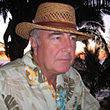
|  |  |  Entertainment | Books | April 2009 Entertainment | Books | April 2009  
Style, Voice, Tone (and Music) in Writing
 David Lyons - PVNN David Lyons - PVNN

| | R.D. Lyons has written 3 novels, which can be purchased in Puerto Vallarta bookstores and at Amazon.com. |  |
Mention Ernest Hemingway and style in the same sentence and automatically the words "short, declarative sentences" come into play. The author's style was revolutionary for its time and distinct enough to be called genius. It was also uniform throughout his work, whatever the subject.

Talk about "voice" and what follows is vague at best. "This writer has found his voice." I suppose what is meant is that the writer is achieving an identifiable style of writing. If you're writing genre fiction such as crime thrillers and you've created a protagonist that readers like and want to revisit in subsequent adventures, then finding that 'voice' is probably useful. If your thrust is literary fiction, it can be helpful also. But what if you write in multiple genres? It's hard to imagine an author's voice used in a thriller being suitable for a romance novel.

My most recent novel differs greatly from my first two. Its voice is of another era. Our much loved and recently departed Sally Conley, who reviewed the book, told me that the narrator - it's written in the first person - sounded to her exactly like a "well educated, upper middle-class Londoner from the early 1900's." Her comment could not have pleased me more. It perfectly describes what I was attempting to achieve. I didn't find my voice, but that of my character.

I prefer the term 'tone' in trying to define style, and one reason I probably like it is because it has musical application as well. I like the comparison of writing fiction and composing music, and I try to keep the analogy in mind as I write.

When you think about it, we're almost programmed to combine the two. Almost simultaneously with first learning to read, we went to the movies. We saw stories on screens. The background for this fiction on film was music, usually classical. To this day certain orchestral interludes bring to mind certain associations; the sunrise, the storm at sea, the Lone Ranger, and so on.

For all writers, fiction and music are interwoven in our subconscious before we commit our first word to paper. My suggestion is, use this ingrained combination. Think of things like melody, rhythm, bass line, solos, etc. as you write.

First, know what kind of mood you are trying to create and make sure it fits in the pacing of your story line. Here's an example. The prodigal son has returned to his father's farm. He's kicked his addiction. His mother died during the time he was out of touch with his family-and reality. The two are walking back to the house from her grave; father with his arm around his only child, partly a gesture of love, partly because he now needs the support of the young man both literally and figuratively.

Visualize that scene. What musical accompaniment do you hear? Quite possibly several classical pieces come to mind. Also possible is the melody from Cat Steven's 'Father and Son.' It could be any jazz or pop standard. It's your vision. Call up your own tune. Just listen to the music in your head and write something that matches the meter and 'tone' that you're hearing.

The accompaniment is in keeping with their slow shuffling walk. In the background are the sounds of a late afternoon on an isolated mid-western farm. I sense the chill of early fall. The characters are talking, but their cadence is slow, the son speaking through his tears. I hear jazz, soft jazz. Good bass line, brushes on snares, piano, maybe Bill Evans style.

If you can't quite hear the music as you write, that's fine. This doesn't work for all writers. It doesn't always work for me. Just write the vision in your mind. When you're done, read it. Listen to your words. Maybe then you'll hear the music in what you've written.

When your words match the accompaniment in your head, my guess is that whatever you want to call it, tone, voice or style, you've got it.
 
A long-time resident of Puerto Vallarta, R.D. (David) Lyons is an accomplished author who has published 3 novels and contributes educational and entertaining articles to several local publications. When not writing, he can be found singing jazz standards to his own guitar accompaniment at several of the town's most popular venues.

Click HERE for more articles by David Lyons. |

 |
|  |



